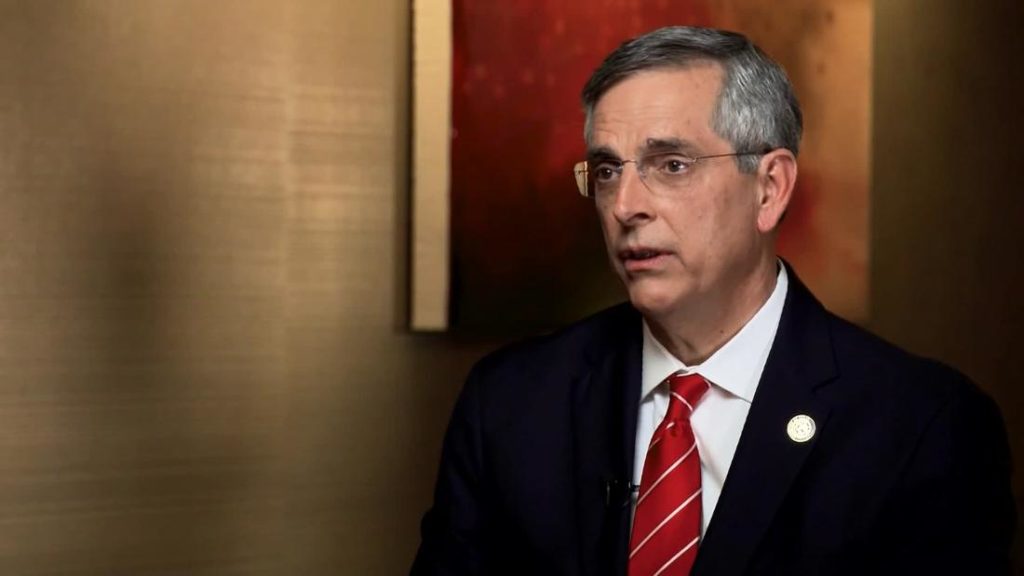
“All I want to do is this. I just want to find 11,780 votes, which is one more than we have because we won the state,” Trump had said.
There have been no credible allegations of any issues with voting that would have impacted the election, as affirmed by dozens of judges, governors, election officials, the Electoral College, the Justice Department, the Department of Homeland Security and the US Supreme Court.
A Georgia prosecutor’s office is taking the extraordinary January 2 phone call between Trump and Raffensperger “seriously as far as a potential case,” as it weighs whether to pursue criminal charges of election fraud against the former President, a source familiar with the office said.
Newly elected Fulton County District Attorney Fani Willis is expected to make some type of announcement on the matter “one way or another” this month, the source said.
CNN previously reported that Willis said in a statement that she will enforce the law “without fear” and that her office was evaluating whether to pursue potential criminal action against Trump.
“Once the investigation is complete, this matter, like all matters, will be handled by our office based on the facts and the law,” Willis said at the time.
David Worley, the only Democrat on Georgia’s five-member State Election Board, told CNN in a statement, “I requested that the Sec. of State open an investigation, now that has been done I will wait to get the report before requesting further action.”
District attorney also has jurisdiction
Worley had earlier told CNN that he planned to ask the State Board of Elections to refer the case to Willis and her office. The Georgia Constitution gives the Fulton County district attorney the jurisdiction to bring charges for any felony that occurs in the county, so Willis and her office have the power within the law to do whatever they felt was appropriate, regardless of the secretary of state’s investigation.
One former federal prosecutor told CNN it’s clear the state can make a case against Trump.
Michael J. Moore, the former US attorney for the Middle District of Georgia between 2010 and 2015 under President Barack Obama, said the Georgia statute that deals with election fraud shows that it is “pretty clear” that the former President committed election fraud during his phone call with Raffensperger.
“If you if you listen to the call, it sounds like any other call that you might have with an organized crime ring or a drug conspiracy ring or something. And that is that you’ve got almost code talking about — this is what I need you to do, if you could just help me out here,” Moore told CNN.
Moore said the way Trump pressured Raffensperger to help him find votes by implying the secretary of state had been involved in some type of wrongdoing was threatening.
“So you take note of things, you read the Georgia statue, and I think it amounts up to a request that the secretary come in, do something untoward or illegal to allow the election to be shifted in a way that was different than the will of the voters, and that would be an effort to commit election fraud,” the former prosecutor said.
Moore also said that it’s not unusual for state prosecutors to look at things happening in the federal courts, and in this case, it’s possible that Willis can watch how the impeachment hearings play out and say she is satisfied with how justice on Trump’s actions is being handled by Congress.
Former prosecutor says it’s a question of intent
Bret Williams, a former prosecutor in the US Attorney’s Office for the Northern District of Georgia, told CNN the crucial question will be Trump’s intent when he repeatedly told Raffensperger and his staff that “I only need 11,000 votes.”
“That’s the first question: Was there a solicitation and an intent behind it? I think you can make a very persuasive argument that that was the case, and that was the purpose of the phone call,” Williams told CNN.
“I do think that you can make an argument — I suspect if it’s charged the defense will — that the President wasn’t making a request, a solicitation of Raffensperger to commit any crime. He was expressing his view that a crime had been committed against him, ironically enough, is I think what he would argue,” Williams added.
“It’s my estimation here that there are arguments on both sides, and it would be a hard-fought situation, a hard-fought case and a difficult decision for a jury to make,” he added.
There were 18 attempted calls from the White House to the Georgia Secretary of State’s Office between the election and the January 2 phone call between Trump and Raffensperger, a Georgia state official confirmed to CNN.
Raffensperger told the Washington Post he was not familiar with the specifics of what the President said in the conversation with his chief investigator, but said it was inappropriate for Trump to have tried to intervene in the case.
“That was an ongoing investigation,” Raffensperger told the newspaper. “I don’t believe that an elected official should be involved in that process.”
This story has been updated with more reporting.
You may also like
-
UK coronavirus variant has been reported in 86 countries, WHO says
-
NASA technology can help save whale sharks says Australian marine biologist and ECOCEAN founder, Brad Norman
-
California Twentynine Palms: Explosives are missing from the nation’s largest Marine Corps base and an investigation is underway
-
Trump unhappy with his impeachment attorney’s performance, sources say
-
Lunar New Year 2021: Ushering in the Year of the Ox

